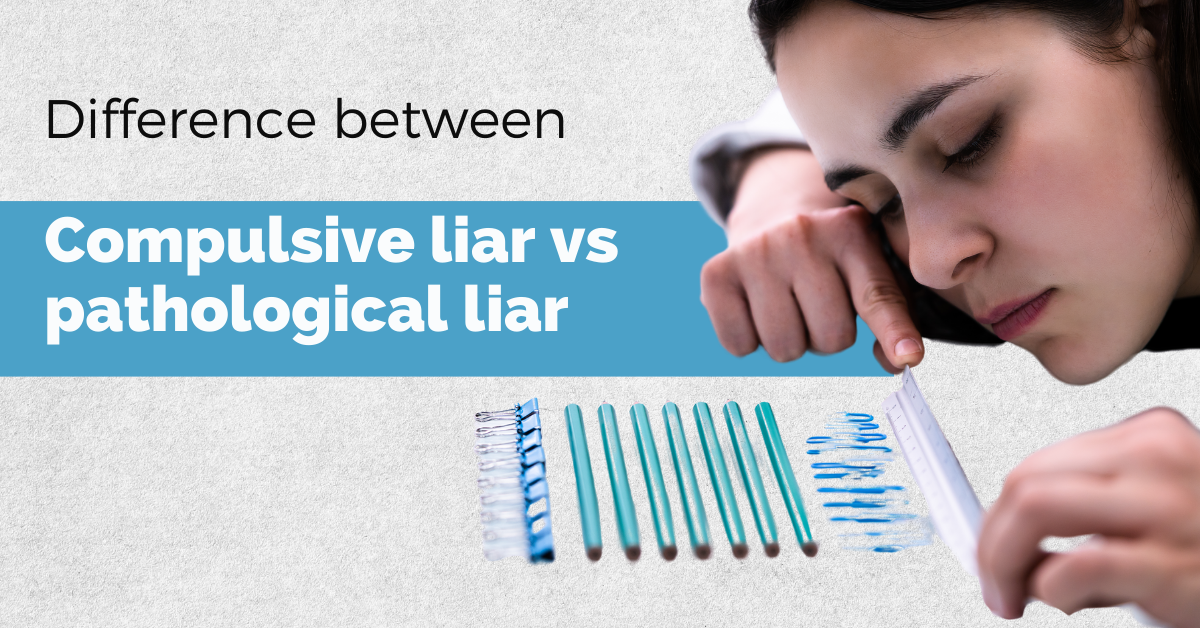
What's the difference between compulsive liar and pathological liar?
Lying is something that everyone does occasionally, whether it's to protect someone’s feelings or avoid trouble. However, when lying becomes a repeated behavior and starts affecting relationships, work, and everyday life, it may be indicative of a deeper issue. This blog will explore the difference between a compulsive liar and a pathological liar, along with treatments available to address these behaviors. Understanding these terms can help you identify whether someone in your life is struggling with a problem that requires professional help.
What Are the Three Types of Liars?
There are several categories of liars, but three of the most commonly recognized types are:
- Compulsive Liars - These individuals lie frequently, often without thinking, and sometimes even without an obvious reason. Their lies may seem harmless but are a repetitive habit.
- Pathological Liars - Pathological liars create elaborate, often fantastical stories, and their lies are driven by the need to manipulate or deceive others. They may lie even when it’s not necessary, and their fabrications often serve to boost their self-image.
- Occasional Liars - These liars are people who lie when the situation demands it but don't habitually do so. They might lie out of fear, to avoid conflict, or to avoid hurting someone's feelings.
What Is the Difference Between a Compulsive Liar and a Pathological Liar?
Although the terms "compulsive liar" and "pathological liar" are sometimes used interchangeably, they are quite different in nature.
- Compulsive Liars typically lie out of habit or impulse. Their lies often lack any significant motive and are told automatically, without any particular goal. They might lie about trivial matters just as easily as about serious issues.
- Pathological Liars lie with the intent to deceive and manipulate. Their stories are usually more elaborate and may involve creating an entire false persona. They lie to control others, gain attention, or satisfy an inner need for validation.
In essence, while compulsive lying is an uncontrollable habit, pathological lying often stems from deeper psychological needs.
Meaning of Compulsive Liar
A compulsive liar is someone who lies frequently, often without a clear purpose. These lies are usually told on the spot, and the person may not even realize they're doing it. The compulsion to lie may be driven by anxiety, a desire to avoid conflict, or a lack of awareness about the negative effects of their behavior.
What Causes Compulsive Liars to Lie Deliberately?
Compulsive liars might lie deliberately due to several factors:
- Low Self-Esteem - Lying can be a way to cover up insecurities or to appear more successful than they feel they are.
- Fear of Conflict - They may lie to avoid confrontation or upsetting others.
- Habitual Behavior - Over time, lying becomes a deeply ingrained behavior, so much so that it becomes automatic.
While they might not have a malicious intent, the consequences of compulsive lying can be damaging to relationships and trust.
Meaning of Pathological Liar
A pathological liar is someone who lies consistently, often for no apparent reason. Unlike compulsive liars, who may lie out of habit, pathological liars tell stories that seem intentional and often aim to manipulate others. Their lies may not make sense, but they continue to fabricate stories, even when confronted with the truth.
What Causes Pathological Liars to Lie Deliberately?
Pathological liars may lie deliberately due to:
- Psychological Disorders - Conditions like narcissistic personality disorder or antisocial personality disorder can contribute to pathological lying.
- Need for Attention or Control - Pathological liars often lie to control situations, gain admiration, or avoid feeling inferior.
- Unresolved Trauma - Past traumatic experiences may lead some individuals to create false narratives to cope with feelings of inadequacy or pain.
Can Compulsive Liars vs Pathological Liars Be Cured?
Yes, both compulsive and pathological liars can benefit from therapy. With the right support, they can learn to recognize their behavior, understand its root causes, and develop healthier ways of coping. Rehabilitation centers, like Calida Rehab - Best Rehab centre in Mumbai, specialize in treating compulsive and pathological liars with therapy and counseling designed to address the underlying issues.
Take Help to Cure Compulsive Liars vs Pathological Liars – Rehab Center in Mumbai and Pune Calida Rehab
If you or someone you know is struggling with compulsive or pathological lying, it’s crucial to seek professional help. best rehab centre in Mumbai and rehabilitation centre in Pune offers specialized therapy for individuals who need assistance overcoming compulsive and pathological lying. Our team of experts helps clients explore the underlying reasons for their behavior and works toward healing and recovery. Don't hesitate to take the first step toward a healthier, more honest future.
Read More Blogs
- Top 10 Rehabilitation Centres in India
- What Is the Difference Between Sadness and Depression?
- How Does Dopamine Play a Role in Addiction?
- The Importance of Rehabilitation in Treating Bipolar Disorder
- Best Practices to Alleviate Pain Points in Early Recovery
- नींद की गोली ज्यादा खाने से क्या होगा?
Treatment for Compulsive and Pathological Liars
At Calida Rehab, our treatment for compulsive and pathological liars focuses on:
- Cognitive Behavioral Therapy (CBT) - A widely used technique that helps individuals recognize and change their harmful thinking patterns.
- Group Therapy - Provides a supportive environment where individuals can discuss their struggles and learn from others facing similar issues.
- Individual Counseling - One-on-one therapy sessions help address personal issues like low self-esteem, fear of rejection, or past trauma.
- Mindfulness Training - Techniques to increase awareness of one’s thoughts and actions, helping to break the cycle of compulsive behavior.
What Is the Difference Between White Lies and Pathological Lies?
White lies are small, harmless lies typically told to avoid hurting someone’s feelings or to make social interactions smoother. They’re often seen as socially acceptable in certain situations. Pathological lies, on the other hand, are falsehoods told with the intent to deceive, manipulate, or create a false reality. Pathological lying is often rooted in deeper psychological issues.
Can a Pathological Liar Love Someone?
Yes, a pathological liar can love someone. However, their lies may create challenges in their relationships, as trust is often broken. Their need to deceive can interfere with intimacy, but with treatment and self-awareness, a pathological liar can learn to build healthier, more authentic relationships.
Can Pathological Liars Have Relationships?
Pathological liars can have relationships, but their lying can create significant challenges. Trust issues often arise, and their need to manipulate or deceive others can strain the relationship. Therapy and counseling can help pathological liars develop healthier communication patterns and build stronger relationships.
